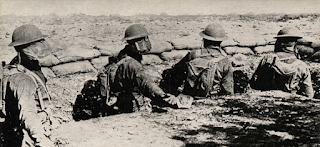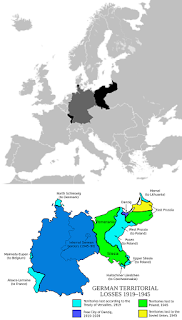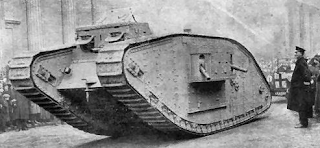Showing posts with label modernism. Show all posts
Showing posts with label modernism. Show all posts
23.10.15
Ressentiment in the Present Age, by Søren Kierkegaard
Excerpt from - Søren Kierkegaard, The Present Age, translated by Alexander Dru with Foreword by Walter Kaufmann, 1962, pp. 49–52.
It is a fundamental truth of human nature that man is incapable of remaining permanently on the heights, of continuing to admire anything. Human nature needs variety. Even in the most enthusiastic ages people have always liked to joke enviously about their superiors. That is perfectly in order and is entirely justifiable so long as after having laughed at the great they can once more look upon them with admiration; otherwise the game is not worth the candle. In that way ressentiment finds an outlet even in an enthusiastic age. And as long as an age, even though less enthusiastic, has the strength to give ressentiment its proper character and has made up its mind what its expression signifies, ressentiment has its own, though dangerous importance. […]
The more reflection gets the upper hand and thus makes people indolent, the more dangerous ressentiment becomes, because it no longer has sufficient character to make it conscious of its significance. Bereft of that character reflection is a cowardly and vacillating, and according to circumstances interprets the same thing in a variety of ways. It tries to treat it as a joke, and if that fails, to regard it as an insult, and when that fails, to dismiss it as nothing at all; or else it will treat the thing as a witticism, and if that fails, then say that it was meant as a moral satire deserving attention, and if that does not succeed, add that it was not worth bothering about. [...]
Ressentiment becomes the constituent principle of want of character, which from utter wretchedness tries to sneak itself a position, all the time safeguarding itself by conceding that it is less than nothing. The ressentiment which results from want of character can never understand that eminent distinction really is distinction. Neither does it understand itself by recognizing distinction negatively (as in the case of ostracism) but wants to drag it down, wants to belittle it so that it really ceases to be distinguished. And ressentiment not only defends itself against all existing forms of distinction but against that which is still to come.
The ressentiment which is establishing itself is the process of leveling, and while a passionate age storms ahead setting up new things and tearing down old, raising and demolishing as it goes, a reflective and passionless age does exactly the contrary; it hinders and stifles all action; it levels. Leveling is a silent, mathematical, and abstract occupation which shuns upheavals. In a burst of momentary enthusiasm people might, in their despondency, even long for a misfortune in order to feel the powers of life, but the apathy which follows is no more helped by a disturbance than an engineer leveling a piece of land. At its most violent a rebellion is like a volcanic eruption and drowns every other sound. At its maximum the leveling process is a deathly silence in which one can hear one’s own heart beat, a silence which nothing can pierce, in which everything is engulfed, powerless to resist.
One man can be at the head a rebellion, but no one can be at the head of the leveling process alone, for in that case he would be leader and would thus escape being leveled. Each individual within his own little circle can co-operate in the leveling, but it is an abstract power, and the leveling process is the victory of abstraction over the individual. The leveling process in modern times, corresponds, in reflection, to fate in antiquity. The dialectic of ancient times tended towards leadership (the great man over the masses and the free man over the slave); the dialectic of Christianity tends, at least until now, towards representation (the majority views itself in the representative, and is liberated in the knowledge that it is represented in that representative, in a kind of self-knowledge); the dialectic of the present age tends towards equality, and its most consequent but false result is leveling, as the negative unity of the negative relationship between individuals.
It must be obvious to everyone that the profound significance of the leveling process lies in the fact that it means the predominance of the category ‘generation’ over the category ‘individuality’.
---------
If you enjoyed this post, you may also like:
8.8.15
Fatality, by Rubén Darío (the founder of literary Modernism)
The tree is happy because it is scarcely sentient,
and even more the hard rock because it no longer feels:
for there is no pain greater than the pain of being alive
nor heavier burden than conscious life.
To be, and know nothing, and be without a sure path,
and the dread of having been and of a future terror...
And the certain scare of tomorrow being dead,
and suffer for life and for the shadow and for
what we do not know and we hardly suspect,
and the flesh that temps us with its fresh racemes,
and the tomb that awaits with its funereal bouquets,
and not know what way we are going,
nor from where we came! ...
------
(Translation from Spanish is mine.)
LO FATAL
DICHOSO el árbol, que es apenas sensitivo,
y más la piedra dura porque ésa ya no siente,
pues no hay dolor más grande que el dolor de ser vivo
ni mayor pesadumbre que la vida consciente.
Ser, y no saber nada, y ser sin rumbo cierto,
y el temor de haber sido y un futuro terror...
¡Y el espanto seguro de estar mañana muerto,
y sufrir por la vida y por la sombra y por
lo que no conocemos y apenas sospechamos,
y la carne que tienta con sus frescos racimos,
y la tumba que aguarda con sus fúnebres ramos
y no saber adónde vamos,
ni de dónde venimos!...
20.7.15
love is more thicker than forget
by E. E. Cummings
love is more thicker than forget
more thinner than recall
more seldom than a wave is wet
more frequent than to fail
it is most mad and moonly
and less it shall unbe
than all the sea which only
is deeper than the sea
love is less always than to win
less never than alive
less bigger than the least begin
less littler than forgive
it is most sane and sunly
and more it cannot die
than all the sky which only
is higher than the sky
--------
You may also enjoy these other poems by Edward Estlin Cummings:
 |
| e.e. cummings enjoys a cigarette with the characteristic stare of someone who loves life and, therefore, living. Hades will have a hard time ever finding this man, :) |
love is more thicker than forget
more thinner than recall
more seldom than a wave is wet
more frequent than to fail
it is most mad and moonly
and less it shall unbe
than all the sea which only
is deeper than the sea
love is less always than to win
less never than alive
less bigger than the least begin
less littler than forgive
it is most sane and sunly
and more it cannot die
than all the sky which only
is higher than the sky
--------
For a review of the background to the life, poetic style, and historical context that shaped E. E. Cummings' exceptional body of work, please read the brief essay immediately after the following poem—
----------
You may also enjoy these other poems by Edward Estlin Cummings:
Labels:
best poems of all time,
Cummings,
Dying,
e.e. cummings,
Edward Estlin Cummings,
emotion,
empathy,
Life,
Living,
love,
love poetry,
modernism,
Relationships,
Semantics,
vitalism
Location:
Edinburgh, UK
4.7.15
since feeling is first, by e.e. cummings
since feeling is first
who pays any attention to the syntax of things
will never wholly kiss you;
wholly to be a fool
while Spring is in the world
my blood approves,
and kisses are better fate
than wisdom
lady i swear by all flowers. Don't cry
-the best gesture of my brain is less than
your eyelids' flutter which says
we are for each other: then
laugh, leaning back in my arms
for life's not a paragraph
And death i think is no parenthesis
-----
Originally published in is 5 by E. E. Cummings. Since it isn't public domain yet, you can read about half of the poems contained therein by clicking here.
-----
e.e. cummings (without capital letters as he did not like capital letters much) was born in Cambridge, Massachusetts, on October 14, 1894. He died on September 3, 1962, being the second most widely read poets in the United States after Robert Frost [read some of his poems], as great a poet and wonderful counterpart precisely because they almost represent polar opposites insofar as style, tone and thematic content.
After completing undergraduate studies and a Masters of Arts at Harvard University by 1916, Edward Estlin Cummings enlisted as a volunteer ambulance driver during World War I. Five months later, he was detained on suspicion of espionage by French authorities. The consistent and constant vitalist message in his poetry, his enduring love of life, is likely a product of having witnessed the "War to End All Wars".
Of course, the "War to End All Wars" did not end all wars and, in fact, led to an even deadlier and longer one, World War II, only two decades later. However, contrary to popular belief, World War I was far more gruesome for participants than was WWII. The reason for this is largely technological. On the one hand, airplanes were still too basic to provide any decisive advantage, and tanks only came into existence near the end of that war, invented by the English and quickly replicated by everyone else, but these were too few, clunky and slow to permit the quick troop movements seen during the Second World War.
On the other hand, the machine gun had been perfected and great strides had been made in artillery, mortars, and in chemical warfare, particularly mustard gas, against which early gas masks afforded little protection.
The result was that the First World War was largely a trench war that was basically a stalemate where troops would advance with many losses from one trench to the next only to have a counterattack drive them back from that trench to where they had come from. The use of toxic gas had two purposes: not only did it provide a cloud of cover that impeded proper aiming by machine guns, it also killed or severely injured the troops holed up in the trench that was being advanced towards.
 |
| Photograph of World War I infantrymen spending their days in trenches covered by sandbags and protected by barbed wire. |
The First World War only ended because the Allied Powers managed to successfully flank the Central Power's trench lines, cutting off their front line troops from receiving supplies. This maneuver led to a Conditional Surrender or Capitulation by the Central Powers (i.e., Germany, the Austria-Hungary Empire, Bulgaria, and the Ottoman Empire), unlike the end of World War II which was concluded in an Unconditional Surrender.
 |
| World map of the Allied Powers, the Central Powers, and their colonies, at the onset of World War I. Allies shown in green; Central Powers shown in orange, and neutral territories are displayed in gray. Russia withdrew from the war in 1917, ceding the territories the Central Powers had managed to occupy following the Bolshevik Revolution and their need to focus on internal affairs as their new state restructured. The United Socialist Soviet Republics would get back control over these territories following World War II. |
The conditions set by the Allied Powers (i.e., the British Empire, France, Italy, and Japan) split the Austria-Hungary into two separate states, spelled the end of the Ottoman Empire, but the conditions were harshest against Germany, being considered the main culprit. These included large territorial transfers, of particular importance are Alsace-Lorraine going to France and most of Western Prussia going to the establishment of the nation of Poland. However, it was the large economic reparations imposed on Germany that led to its economic collapse soon afterwards and allowed the Nazi Party's rise to power. Not surprisingly, one of Hitler's first orders of business was to violate the Treaty of Versailles via a surprise re-militarization in 1936 of the Rhineland; moreover, the German invasion of Poland on September 1939 marks the beginning of the Second World War. Allied cowardice permitted it all, and Hitler would later say "If France had then marched into Rhineland, we would have had to withdraw with our tail between our legs", a hypothetical event that would have likely prevented WWII altogether because the French army was still overwhelmingly larger and better equipped than Germany's given that the latter had just begun the rebuilding of their military strength.
 |
| Click to Enlarge. German territory at onset of World War I and the remaining territory at the end of World War II, in gray at top, in blue at bottom. The reunification of Germany did not occur until 1990, following the 1989 fall of the Berlin Wall. |
History aside, the psychological effects of the dehumanizing nature of World War I and the mass and unusually cruel deaths that were everyone to be seen had a profound influence on e.e. cummings' celebration of life, living, and the vitality in all of us that most people either hinder or ignore.
 |
| Otto Dix (1924) "Shock Troops Advance under Gas". Otto Dix participated in what is known as Germany's cultural Golden Age during the decade of the 1920s. |
----------
Read more poems by Edward Estlin Cummings.
Labels:
alive,
Awake,
best poems of all time,
Cummings,
Death,
Dying,
e.e. cummings,
Edward Estlin Cummings,
ethics,
is5,
Living,
love,
modernism,
morality,
vitalism,
War,
wisdom
Location:
Chicago, IL, USA
30.5.15
Be kind, by Charles Bukowski
we are always asked
to understand the other person's
viewpoint
no matter how
out-dated
foolish or
obnoxious.
one is asked
to view
their total error
their life-waste
with
kindliness,
especially if they are
aged.
but age is the total of
our doing.
they have aged
badly
because they have
lived
out of focus,
they have refused to
see.
not their fault?
whose fault?
mine?
I am asked to hide
my viewpoint
from them
for fear of their
fear.
age is no crime
but the shame
of a deliberately
wasted
life
among so many
deliberately
wasted
lives
is.
24.5.15
now does our world descend, by e.e. cummings
now does our world descend
the path to nothingness
(cruel now cancels kind:
friends turn to enemies)
therefore lament,my dream
and don a doer's doom
create now is contrive;
imagined,merely know
(freedom:what makes a slave)
therefore,my life,lie down
and more by most endure
all that you never were
hide,poor dishonoured mind
who thought yourself so wise;
and much could understand
concerning no and yes:
if they've become the same
it's time you unbecame
where climbing was and bright
is darkness and to fall
(now wrong's the only right
since brave are cowards all)
therefore despair,my heart
and die into the dirt
but from this endless end
of briefer each our bliss -
where seeing eyes go blind
(where lips forget to kiss)
where everything's nothing
- arise,my soul;and sing
--------
For an informative background of the life, style, and historical context encasing e.e. cummings' exceptional body of work, please read the article immediately after the following poem—
You may also enjoy these other poems by Edward Estlin Cummings:
Labels:
best poems of all time,
Courage,
Death,
Dying,
e.e. cummings,
Edward Estlin Cummings,
ethics,
excellence,
Fear,
Life,
Living,
modernism,
morality,
morals,
poem,
poetry,
Self-Actualization,
Self-Realization,
vitalism
Location:
Manhattan, New York, NY, USA
29.3.15
If you like my poems, by e.e. cummings
 |
| Edward Estlin Cummings poses, embodying a success all-too-rare for a career poet, exuding a charisma that contains a joy of life that is contagious throughout his poetry. |
if you like my poems let them
walk in the evening,a little behind you
then people will say
"Along this road i saw a princess pass
on her way to meet her lover(it was
toward nightfall)with tall and ignorant servants."
--------
For an informative background of the life, style, and historical context encasing e.e. cummings' exceptional body of work, please read the article immediately after the following poem—
You may also enjoy these other poems by Edward Estlin Cummings:
Labels:
alive,
best poems of all time,
Cummings,
e.e. cummings,
Edward Estlin Cummings,
Living,
love,
love poem,
masters,
modernism,
poetry,
purpose of poetry,
Secrets,
Self-Realization,
slaves,
wealth,
wellbeing,
wisdom
Location:
Los Angeles County, CA, USA
Subscribe to:
Comments (Atom)
Featured Original:
How You Know What You Know
In a now classic paper, Blakemore and Cooper (1970) showed that if a newborn cat is deprived of experiences with horizontal lines (i.e., ...

-
The Minnesota Multiphasic Personality Inventory (MMPI-2) is the most comprehensive personality test currently available. Using 567 true or ...
-
Both the long and short forms of the MMPI-2 but not the MMPI-A commonly given to adolescents are available through this link . The Minne...








